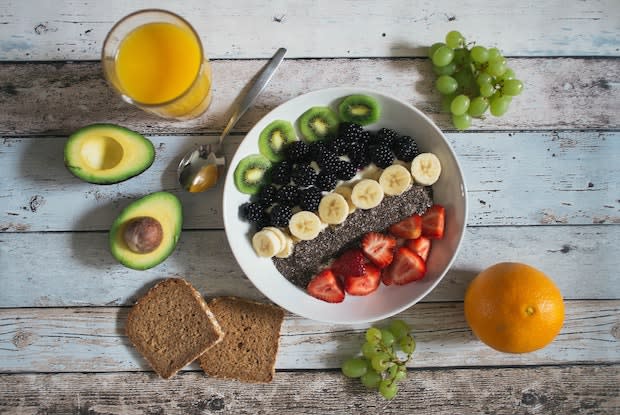Table of Contents
c. Reduce Processed Food Intake
Every woman will experience menopause at some point in their life. This fact of life is not always pleasant and often causes disruptive symptoms. The severity of menopause symptoms differs from woman to woman, but a dip in estrogen levels occurs to all women going through this change of life. Menopause officially occurs when a woman has not had a menstrual period for a whole calendar year. This happens because estrogen levels decrease, making it so the body can no longer have a baby.
Some women may have mild menopause symptoms like hot flashes and sleep disturbances, but if menopause symptoms begin to affect your daily activities, you may want to talk to your doctor. You may be prescribed estrogen replacement therapies like Climara patches, Estraderm patches, or Prometrium (progesterone). These medications are beneficial in treating menopause symptoms, but there are several things you can do at home to make the transition to post-menopause life more tolerable. Read on to learn more about natural remedies for menopause symptoms. [1]
Some research suggests that a dip in estrogen may affect the role of the body’s metabolism. It may slow down and cause the body to put on more weight than normal. Women who never had an issue maintaining their weight may begin to have trouble before or during menopause. If you’ve never had to exercise too strenuously or watch your diet, you may have to adopt some new habits when menopause takes hold. Exercise is an important part of a menopause treatment plan. You may have to participate in more heart-pumping activities, which improve memory, mood, and bone health. Exercise helps manage weight and keeps the body strong. If you exercise regularly, you can also reduce your risk of bone fractures from osteoporosis, which is more likely to occur in menopausal women. [2] Exercise is all fine and good, but exercise will not have the same effect if you are consuming unhealthy foods. Diet and exercise need to work in tandem to fuel the body properly and keep weight under control. The risk of high cholesterol also increases with the onset of menopause, so a new diet routine can lower your risk of cardiovascular disorders. [2] Fruits and vegetables do several beneficial things for the body. Fruits and vegetables are low-calorie and can help you feel full. Eating fresh foods can help prevent bone loss caused by osteoporosis and lower your risk of heart disease. One study of 3,236 women aged 50-59 found that those who had diets full of fruits and veggies experienced less bone breakdown. Phytoestrogens are naturally occurring plant compounds that may mimic the effects of estrogen in the body. Many foods contain these compounds and may help balance hormones. Eating these foods does not provide the body with as much estrogen as prescription medications like Estraderm patches, but it may assist in some symptom relief. Foods rich in phytoestrogen include: A diet high in refined carbs and sugar is not beneficial for anyone, but it may be especially disruptive to a woman in menopause. These unhealthy foods can cause your blood sugar to rise and dip drastically, causing you to feel tired and irritable. These feelings may develop into depression. Research suggests that this type of diet may increase the risk of depression in postmenopausal women. These foods may also lead to a greater risk of osteoporosis. [3] It is important to develop a healthy vitamin routine to lower your risk of menopausal complications. Before starting new vitamins, make sure your doctor approves them. Talk to your doctor about the following helpful vitamins to take during and after menopause: Vitamin D: This vitamin helps the body absorb calcium more easily. Once you turn 50, you should try to consume 800-1000 IU of vitamin D a day. If you live in a place where natural sunlight is reduced during the year, your doctor may recommend a higher dose. During the summer, you should try to get outside and soak up the sunlight. Calcium: Calcium is integral to bone health. As the body ages, bones weaken and become porous, which increases the risk of fractures (osteoporosis). Estrogen and calcium levels often dip together, so you may want to start a calcium supplement regime if you experience perimenopause (the period before full menopause). It is recommended that women 51 and older should take 1,200 milligrams of calcium a day. Vitamin B6 and B12: Studies have shown that B6 can increase energy and serotonin. This vitamin can play a large role in preventing depressive symptoms. Make sure not to take more than 100 milligrams of B6 a day to avoid complications like nerve damage. Menopausal women can also take B12 to increase energy, improve heart health, and gut health. [4] Women should only implement these natural methods under the supervision of their doctor. If you begin taking certain vitamins or foods and notice odd symptoms, you should talk to your physician as soon as possible. Your doctor will also let you know if any of these methods interact with prescriptions of estrogen replacement medications like Climara patches, Estraderm patches, or Prometrium (progesterone). The content in this article is intended for informational purposes only. This website does not provide medical advice. In all circumstances, you should always seek the advice of your physician and/or other qualified health professionals(s) for drug, medical condition, or treatment advice. The content provided on this website is not a substitute for professional medical advice, diagnosis, or treatment.
Keep the Body Moving
Diet Changes
a. Fruits & Vegetables

b. Phytoestrogen Foods
c. Reduce Processed Food Intake
Take Your Vitamins

